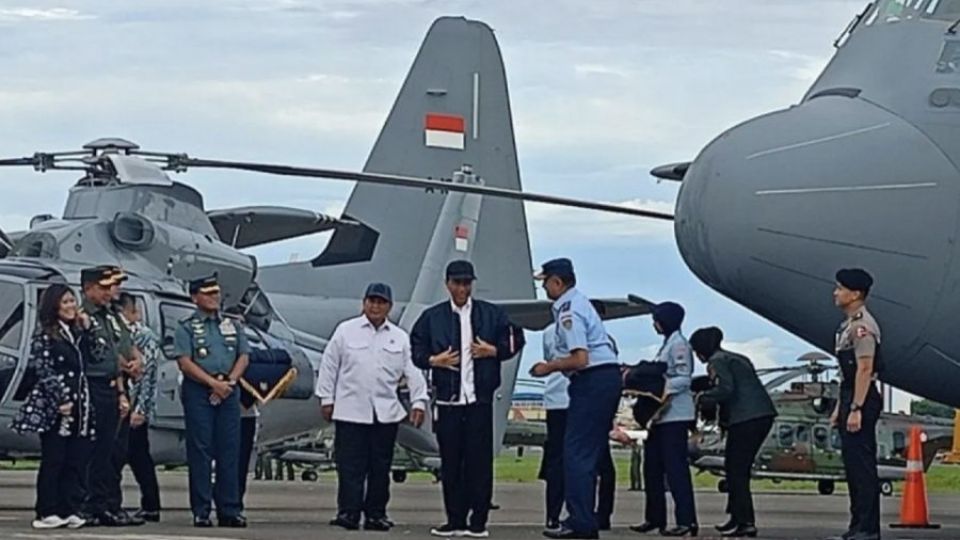February 1, 2024
JAKARTA – President Joko “Jokowi” Widodo faces growing pressure to take an unpaid leave of absence following his recent comments about reserving the right to take sides in the 2024 presidential election.
Jokowi made headlines last week when, in response to questions from the press, he said that a sitting president was entitled by law to take sides and campaign for the candidate of his or her choosing, provided that no state facilities are used in the process.
The President doubled down on his remarks in a recorded statement posted to video sharing platform Youtube on Friday in which he held up a large poster and pointed to passages from the 2017 General Elections Law that specifically allowed presidents and vice presidents to participate in election campaigning.
“Don’t interpret it otherwise. I simply conveyed the provisions of the law because I was asked,” he quipped.
The stunt riled election observers, pro-democracy activists and campaigners for certain election tickets, some of them noting that Jokowi was only selectively stating provisions while leaving out other important details, such as needing to take leave when engaging in campaign activities.
“President Jokowi and all his ministers are state officials who must maintain neutrality in elections. They are prohibited from taking actions or making decisions that may benefit or hurt any [election] candidate, including during the campaign period,” said Titi Anggraini, a constitutional law expert at the University of Indonesia.
“If the President wants to campaign, he must take leave, publish his leave of absence documents for the public to see and [tell us] where the documents will be processed, and all that must be done seven days in advance,” she said in a statement after the incident.
Under the 2017 law, sitting presidents, vice presidents and other state officials are allowed to engage in campaign activities, but are prohibited from using state facilities and are required to take an unpaid leave of absence when participating in such political activities.
The law also prohibits “state officials in structural and functional positions […] from making decisions and/or taking actions that benefit or adversely impact one of the [election candidates] during the campaign period”.
Domino effect
Analysts have underlined that Jokowi making his contentious remark while standing next to Prabowo Subianto, the current presidential election frontrunner, was problematic from the get-go.
Some were convinced the move was intended to convince supporters that he was siding with the defense minister in next month’s election.
“Jokowi may have this perception that not all of his supporters are aware that he is rooting for Prabowo,” said Adi Prayitno, a political analyst from the Syarif Hidayatullah State Islamic University (UIN).
“By dispensing such comments with Prabowo at his side, we can actually see he is trying to send a message that he is standing beside his successor,” he told The Jakarta Post on Saturday.
Jokowi’s remark could have “a far-reaching domino effect” that may potentially undermine honest and fair elections, as it gives state officials in the regions the justification they need to take sides in the upcoming polls, even when the law clearly forbids it, according to Usep Hasan Sadikin, a researcher at the Association for Elections and Democracy (Perludem) election watchdog.
“State officials could openly invite members of the public to support their candidates, which is problematic,” Usep told a recent press conference, noting that it might prompt a wave of election violations “across regions”.
Despite his initial pledge of neutrality, Jokowi has become more overt about where he stands regarding the election, making gestures that analysts suggest showed his support for Prabowo, who is running with the President’s oldest son, Gibran Rakabuming Raka.
Critics have also claimed that Jokowi’s recent work visits have been designed to shadow the campaign rallies of Prabowo’s rivals in a bid to marshal support for the minister. The incumbent has shrugged off the allegation.
Early on Sunday, Jokowi met with Democratic Party chairman Agus Harimurti Yudhoyono in Yogyakarta ahead of a planned rally nearby for rival candidate Ganjar Pranowo of the Indonesian Democratic Party of Struggle (PDI-P). Agus is part of a big-tent alliance backing Prabowo’s presidential bid.
Last week, the President was reported to the Election Supervisory Agency (Bawaslu) after First Lady Iriana was caught on video gesturing with two fingers, symbolizing the ballot number for the Prabowo-Gibran ticket. She was seen making the hand sign after stepping out of the presidential car during a visit to Central Java.
Grassroots rejection
Jokowi has also been implementing populist government programs that analysts insist were made in support of Prabowo’s bid. Among them, the President made El Niño cash handouts that targeted low-income households and gave civil servants their first pay raise in five years.
Speculation over the political use of social aid intensified last week after photos of rice produced by the State Logistics Agency (Bulog), which makes up part of the state’s care packages, featured a Prabowo-Gibran sticker and went viral on social media.
Negative sentiments over Jokowi’s claim of his right to campaign have also dominated recent public conversations, prompting an online movement on social media platform X, formerly Twitter, dubbed “Four Fingers” calling for voters not to vote for Prabowo and Gibran.
As a self-styled expression against political dynasties and oligarchs, the movement calls on people’s solidarity to support the alliance of Prabowo’s rivals, Ganjar and Anies Baswedan, amid attempts by “invisible hands” that do not want the two camps to join forces.
The online movement was welcomed by both the Ganjar and Anies camps, who reportedly have been in talks to prevent Prabowo from securing an outright victory in February’s election and to support one another if either makes it to a runoff.
“These are the people’s aspirations, the voice of the grassroots who want unity against anti-democratic groups,” said PDI-P politician Masinton Pasaribu on Saturday.


